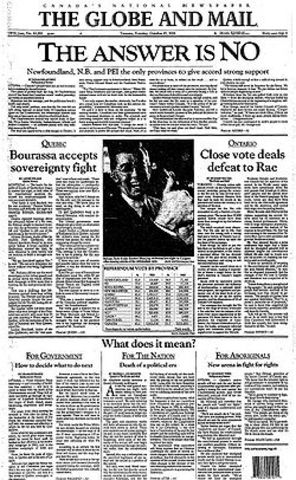
Here’s something interesting about a relatively obscure part of the Canadian constitution. You know the powers of reservation and disallowance? Probably not, because if you were born after 1961 neither of them have been used in your lifetime, so here’s a summary. Basically reservation empowers a lieutenant governor to pass a provincial bill up to the federal government to be approved or quashed, while disallowance empowers the federal government to quash a law that has received assent at the provincial level (as long as this is done within one year). These powers were used willy nilly for a time following Confederation, but were increasingly regarded as intrusive, undemocratic and contrary to the spirit of federalism. The last time a provincial bill was reserved, the federal government approved it on principle despite almost certainly disagreeing with the substance (Diefenbaker was PM, while the reserved bill originated from the CCF-controlled legislature in Saskatchewan). While the provisions on reservation and disallowance are still in the books, the usual story is that they’re obsolete by convention.
HOWEVER.
In 1992, a major package of constitutional reforms — the Charlottetown Accord — was submitted to a referendum. Among these reforms, sections 55 and 90 of the Constitution Act 1867 — the provisions of the Act that define the powers of reservation and disallowance as they apply between the provincial and federal governments — had been rewritten. The new version omitted the power of reservation but retained the power of disallowance (albeit a somewhat curtailed version restricting the federal government to instruct the lieutenant governor to refuse royal assent). This seems to undermine the usual story that the power of disallowance is obsolete by convention.
Why? Recall that a constitutional convention is an unwritten, non-justiciable (meaning it can’t be enforced by the courts) constitutional rule that exists only in virtue of being recognized and treated as binding by the political actors to whom it applies. To say that the power of disallowance is obsolete by convention is to say that the relevant political actors recognize and treat as binding a rule that forbids the use of the power of disallowance. If disallowance is forbidden by convention, then the legal rule permitting disallowance is of no use. But if the legal rule permitting disallowance is of no use, why would you deliberately redraft the relevant provisions to retain the rule permitting disallowance? The only reasonable conclusion, I think, is that the rule permitting disallowance as a matter of law was retained with the intention that disallowance ought to be permitted, full stop.
If this was the intention, then the inclusion of the rule permitting disallowance suggests that disallowance is still permitted as a matter of convention. That’s because Charlottetown represented just about the broadest elite consensus you can imagine. Every major political party and all the provincial governments supported it; it failed to pass only because it was defeated in the referendum. We can conclude, then, that the power of disallowance was acceptable to most of the political actors to whom an anti-disallowance convention would apply. This means that as of 26 years ago, there was no convention forbidding the use of disallowance. So the claim that there is now a convention forbidding the use of disallowance can’t depend on the observation that disallowance hasn’t been used in a long time — after all, that was true in 1992 too. To conclude that there is now a convention against disallowance, something must have happened in the last 26 years that indicates disallowance is now regarded as forbidden. As far as I can tell, nothing like that has happened. I conclude that disallowance is still permissible both as a matter of law and as a matter of convention.
That’s not to say that Trudeau could ring up Julie Payette tomorrow and start quashing provincial laws all over the place. I concede that the use of disallowance would be contrary to the prevailing political mood, which currently favours a more decentralized kind of federalism. But a constitutional convention is more than a prevailing political mood. Moods are more changeable, for one. And over the course of Canadian history, the prevailing mood has at times favoured the practice of a considerably more centralized kind of federalism. If and when the pendulum swings back in that direction, it is reasonable to think that the power of disallowance could be exercised regularly once again.

